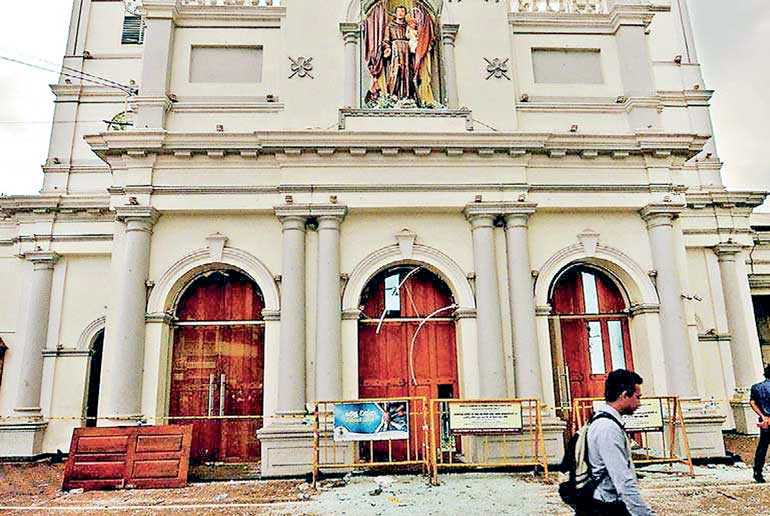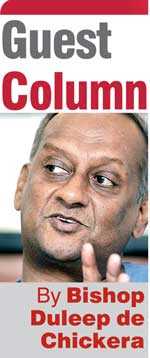Saturday Feb 07, 2026
Saturday Feb 07, 2026
Tuesday, 11 June 2019 00:00 - - {{hitsCtrl.values.hits}}

Real stories-real racism
A Colombo taxi driver informed a customer that he was a Muslim. It sounded like an apology. His two previous hires had been cancelled after his cultural identity had been guessed.
In the hill-country, a group of persons got into a heated argument with a woman who had accompanied her daughter to an interview. One of them called the police and the woman was taken in for questioning. It had nothing to do with the petty quarrel. She had a scarf draped over her head. 
In the deep-south a Muslim family was asked to leave a private bus. The conductor was barely out of his teens. None of the other passengers objected. The difference it would have made to the humiliated family did not seem to matter.
In several places around the country an unofficial boycott of Muslim shops and businesses is in place. This gets worse when non-Muslims who step into Muslim shops are intimidated as they step out, and Muslims who step into non-Muslim shops are turned away.
This shameful trend took a painful turn in an act of self-infliction at Kekirawa. The destruction of a mosque by some Muslims was a desperate attempt for survival. The ‘perceived enemy’ seemed to be pointing at the ‘real enemy’ so that social anger would be directed elsewhere. The act nevertheless amounted to a criminal breach of the peace. No matter the cheering squads, those who picked up sledge hammers and took the law into their own hands should be prosecuted.
Any credible evidence of sedition being planned or fanned at the demolished mosque should have been passed on to state authorities. Intra-Muslim violence brings neither credit nor credibility to anyone. It only spreads what it expects to stop. Already judged by their own, the ‘enemy’ Muslims have overnight become targets.
These real stories are about an intrinsic part of the Sri Lankan whole, harassed and sidelined before our very eyes. The speed with which this brazen discrimination and intimidation has spread is shocking. That it happens while those tasked to ensure order and national integration do little to stop it, is outrageous.
Tragedy and obligations
The horrific Easter Sunday bombings spread shock, fear and anger and can never be forgotten. For Christians, remembrance is at the heart of public worship. In fact when the public remembrance of the dead was denied to the Tamil community for decades, Christians in all parts of the country remembered the dead with thanksgiving, as they remembered the death and resurrection of Christ with thanksgiving. However, the difference Easter 2019 will make to future celebrations is that it will correctly extend Good Friday into the realm of hope, affirming that human suffering and human awakening may not be separated.
Easter Sunday 2019 also demanded vigilant security operations. Such a continuing task that requires efficiency, sensitivity, and speed, is best left to those trained and set aside to do so. If done professionally, the ethnic identity of citizens will not matter. If not, and our security establishment is biased or weak, nationalists and propagandists will take over, and the ethnic identity of citizens will be made to matter.
But professionalism among the security forces only is not enough. The president, our legislators and public officials in charge of state institutions are to ensure the freedom and equal treatment of all. The democratic mechanisms they uphold will then swiftly resist the incitement of hatred. For instance, shops that refuse to serve some cultures, would be prosecuted and lose their licenses, and those in charge of police stations, where some cultures are treated harshly, would be disciplined if found guilty.
Failed governance
But in reality this will not happen. Our legislators will not contest the rising animosity against Muslims. Their behaviour in parliament, on the streets and before the cameras, say it all. Consequently, most public officials will not dare to be different. The prospect of a politically manipulated transfer, or isolation in the face of a trumped-up inquiry, undermines accountability to the core, and permits the country to divide and rule itself. The system, meant to work as a whole, cannot work for long if it works in parts. The body disintegrates when the head becomes dysfunctional.
The craving for political power and prominence, coupled with a death of conscience, best explains this unwillingness. This is why the president, prime minister, leader of the opposition and all other legislators have not stood together against racism and the prosecution of racists, and this is why they have not collectively affirmed the Muslim community as law abiding citizens. These are unconditional obligations of any democratic leadership, so admirably demonstrated by Jacinda Ardern, the PM of New Zealand.
Standing for the protection, rights and dignity of a smaller community of citizens in times of communal unrest has seldom been a characteristic of persons at the helm of governance in this country. To the contrary, minorities are projected as dispensable and repeatedly disowned.
A glaring example of this practice is the recent release of one with an accumulated record of hatred and aggression against the Muslim community. That this was done at the height of anti-Muslim prejudice, by the highest in the land, indicates the depth to which sectarianism is entrenched in our structures. The word used was pardon. Contempt, poured this way on a Contempt of Court judgement, can only bring contempt on the office authorised to pardon.
A state of anomie
The aftermath of the Easter Sunday bombings confirmed what has been observed for some time. Long before the tragedy, the country was sliding into a state of anomie; a term the 19th century French Sociologist, Emile Durkheim, coined to describe the chronic absence of norms. It was this hollow state of affairs that was exploited by extremists to legitimise anti-Muslim animosity, after the Easter Sunday bombings.
As governments have changed over the years, one hard fact has remained constant. Those endowed with responsibility to protect, have lost the integrity, wisdom and courage to be equally fair by all citizens. When this gift is lost, the ability to govern is undermined.
Lessons from schoolboys
Last Saturday, school-boys played a fine game of rugby in Kandy. One team was led by a smart and unassuming Muslim boy. Other than his name, nothing during the game reflected the current malaise on our streets. His team, the other team, the referee, the spectators and the commentators, they all ‘played the game.’ Back slaps and hugs after the game indicated that no team had lost.
These thirty plus young sportsmen teach their president, PM, leader of the opposition and all other legislators, a lesson they can still learn. It is certainly possible to play hard and fast, amidst shifting advantages and reversals, and yet keep it clean and fair.
With peace and blessings to all